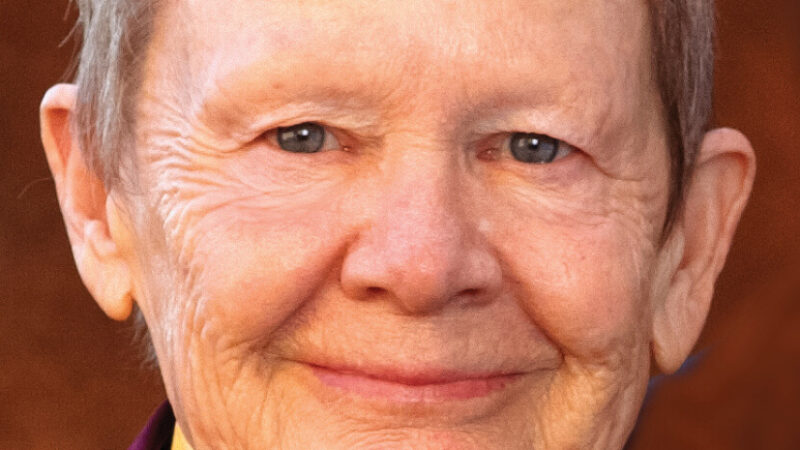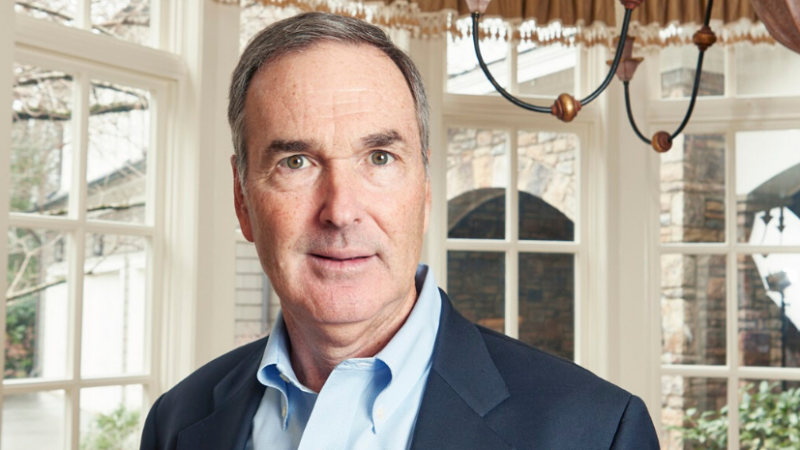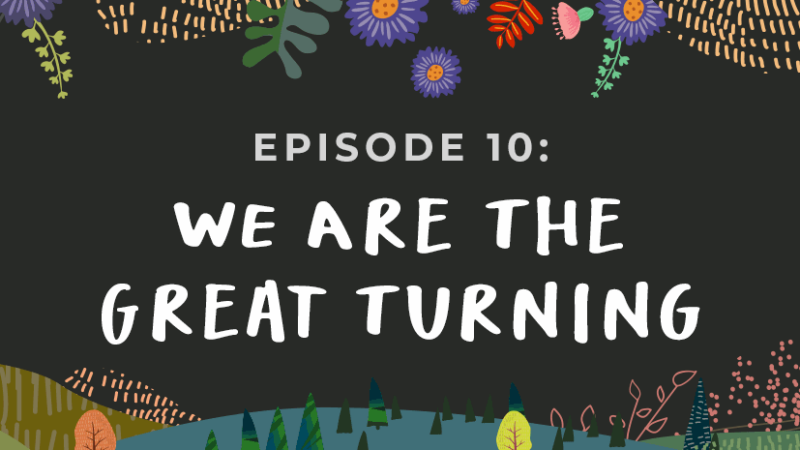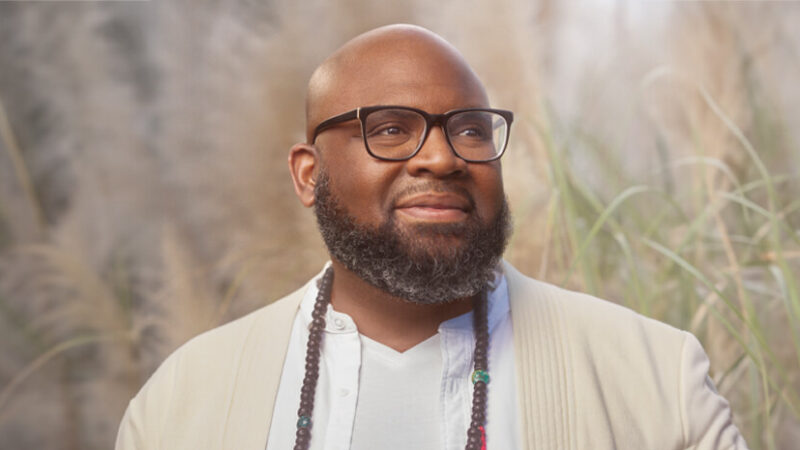-
E117: The Real Work: Letting Go from Within
Michael Singer — October 2, 2025
True spirituality isn’t about mystical experiences or lofty ideals—it’s about honestly facing...
-
Once More: Reflections on Reincarnation and the Gap Between Lives
Tami Simon — September 26, 2025
In this special reflection episode of Insights at the Edge host Tami Simon looks back on her...
-
Honey Tasting Meditation: Build Your Relationship with Sweetness
There is a saying that goes “hurt people hurt people.” I believe this to be true. We have been...
Written by:
Amy Burtaine, Michelle Cassandra Johnson
-
Many Voices, One Journey
The Sounds True Blog
Insights, reflections, and practices from Sounds True teachers, authors, staff, and more. Have a look—to find some inspiration and wisdom for uplifting your day.
Standing Together, and Stepping Up
Written By:
Tami Simon -
The Michael Singer Podcast
Your Highest Intention: Self-Realization
Michael Singer discusses intention—"perhaps the deepest thing we can talk about"—and the path to self-realization.
This Week:
E116: Doing the Best You Can: The Path to Liberation -
Many Voices, One Journey
The Sounds True Blog
Insights, reflections, and practices from Sounds True teachers, authors, staff, and more. Have a look—to find some inspiration and wisdom for uplifting your day.
Take Your Inner Child on Playdates
Written By:
Megan Sherer
600 Podcasts and Counting...
Subscribe to Insights at the Edge to hear all of Tami's interviews (transcripts available, too!), featuring Eckhart Tolle, Caroline Myss, Tara Brach, Jack Kornfield, Adyashanti, and many more.
Most Recent
Pema Chödrön: “Compassionate Abiding”
How do we find a sense of stability when everything seems so groundless? Pema Chödrön is celebrated around the world for her ability to help us turn toward things that are difficult and embrace our uncertainty. In this week’s podcast, Pema joins Tami to share her one-of-a-kind guidance, including a special practice she calls “compassionate abiding.” Tami and Pema also talk about how to stay embodied when panic arises, accessing the wisdom inherent in our emotions, and the importance of cultivating “unconditional friendship” and befriending even those parts of ourselves that we want to reject.
The Power of Mapping Your Emotions
It’s in everyone’s best interest to learn to remove the emotional blinders and identify emotions accurately, both the uncomfortable and the upbeat ones. After all, unpleasant emotions are normal and natural, a fundamental part of being human. Emotions fluctuate on a daily basis, often several times in a given day. If you didn’t experience negative feelings now and then, the positive ones wouldn’t be as noteworthy or joyful; your emotional life would likely be unnaturally narrow. You would also be deprived of the opportunity to glean important insights into yourself. Feelings, both the good and the bad, are silent messages, alerting you to pay attention to something in your personal or professional life, in your behavior, or in the world around you.
Instead of separating emotions into categories such as good or bad, positive or negative, happy or sad, it’s better to view all your emotions as useful information, as “evolutionarily evolved responses that are uniquely appropriate to specific situations,” says Karla McLaren, MEd, author of The Language of Emotions. “When you stop valencing, you’ll learn to empathically respond to what’s actually going on—and you’ll learn how to observe emotions without demonizing them or glorifying them.”
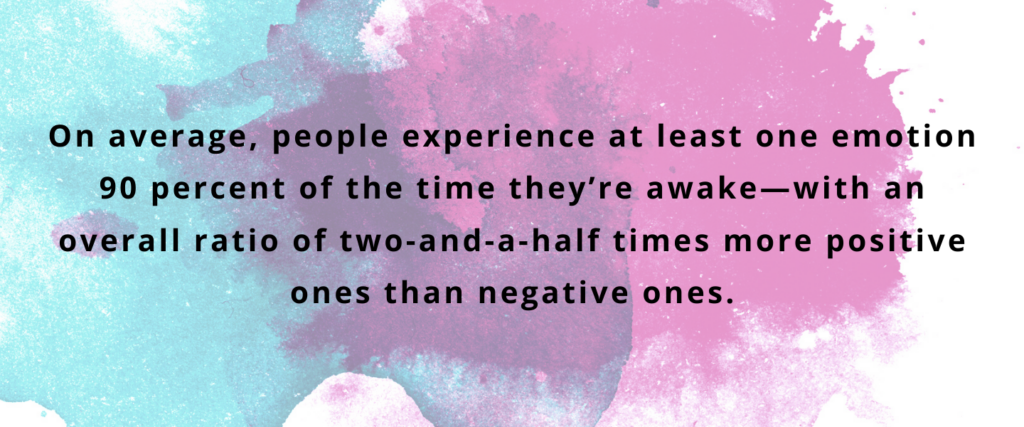
Being able to recognize and express what you’re feeling helps you better understand yourself (leading to greater self-knowledge); validate your emotions and tend to your own emotional needs; and take steps to address those feelings directly by communicating and responding to them effectively. Having emotional self-awareness can motivate you to make healthy changes in your life, take action to improve the world around you, and become more psychologically resilient—that is, better able to cope with crises and rebound from setbacks.
Learning to Unpack Your Emotions
For some people, engaging in free association can clear the cobwebs from their minds, almost like opening the cellar door to a musty basement and letting in light and fresh air. To do this, you might take a break and consider how you’re feeling about what you’re doing, reading, seeing, or thinking every few hours throughout the day. If a general word comes to mind—such as stressed, anxious, or angry—dig deeper and ask yourself what other emotions you might be feeling (maybe fear or annoyance) along with it. If you do this out loud in unedited, private moments, you might find yourself blurting out what you’re really thinking or feeling, revealing the emotions that are taking a lot of energy to keep inside. This is really about unpacking your suitcase of feelings, or untangling the knot of emotions that is taking up space inside you.
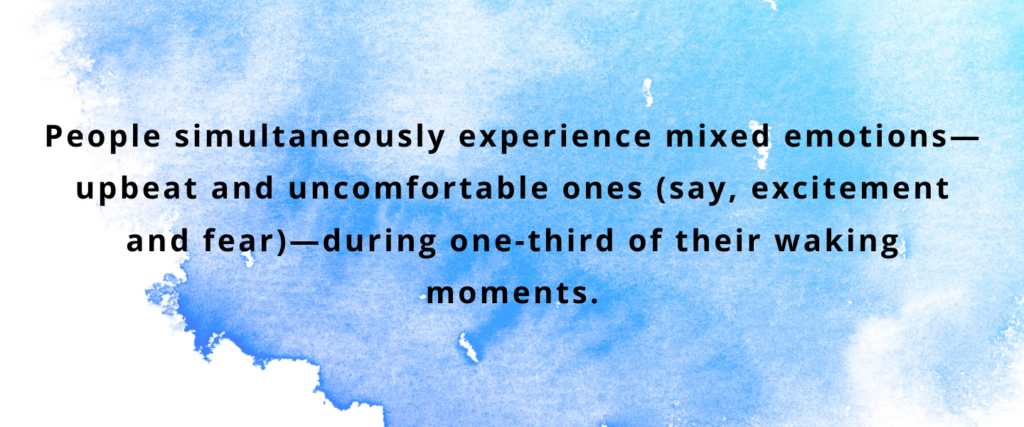
When you think about this in the abstract, it can be hard to pinpoint how you’re feeling. You may just see a swirling mass of a feeling quality such as “dread” or “foreboding” rather than recognizing the specific emotions you feel. To get to the root of your feelings, spend five minutes looking at the word cloud below—no more than five so that you don’t have time to filter your responses—and choose the emotions that resonate with your mood-state lately.

If reviewing these words evokes other feelings for you or if words or phrases that apply to you were not on this word cloud, jot these down in the blank word cloud that follows. Give yourself another five minutes to think about your recent state of mind and jot down phrases, images, or words that occur to you. This is your opportunity to personalize it without any limits or restrictions. If you feel stymied or draw a blank initially, think about your recent responses to current events or situations in your personal life or on the world stage. Try to be as honest as you can by focusing on how you’re really feeling when no one is watching—free-associate without judging, censoring, or revising what you write down.
Once you’ve finished your list, look at the order of the words you wrote down: Did they progress from all negative to increasingly hopeful? Do they portray an internal tension or friction in going back and forth between various feelings? If all the words are positive, consider the possibility that you may be in some degree of denial, focusing only on the window dressing rather than the emotions that lie beneath the surface. Also, consider this: Is there a pattern of shallow, visceral reactions that came out initially, followed by more complex thoughts and feelings? If so, think about whether you’re giving yourself enough time in your life to reflect. If you came out with highly intellectualized words or phrases first, it might suggest that you put on a bit of a facade when engaging with the world, and you might benefit from striving for a deeper engagement or familiarity with your emotions.
This is an excerpt from Emotional Inflammation: Discover Your Triggers and Reclaim Your Equilibrium During Anxious Times by Lise Van Susteren, MD, and Stacey Colino.
Buy your copy of Emotional Inflammation at your favorite bookseller!
Sounds True | Amazon | Barnes & Noble | Bookshop
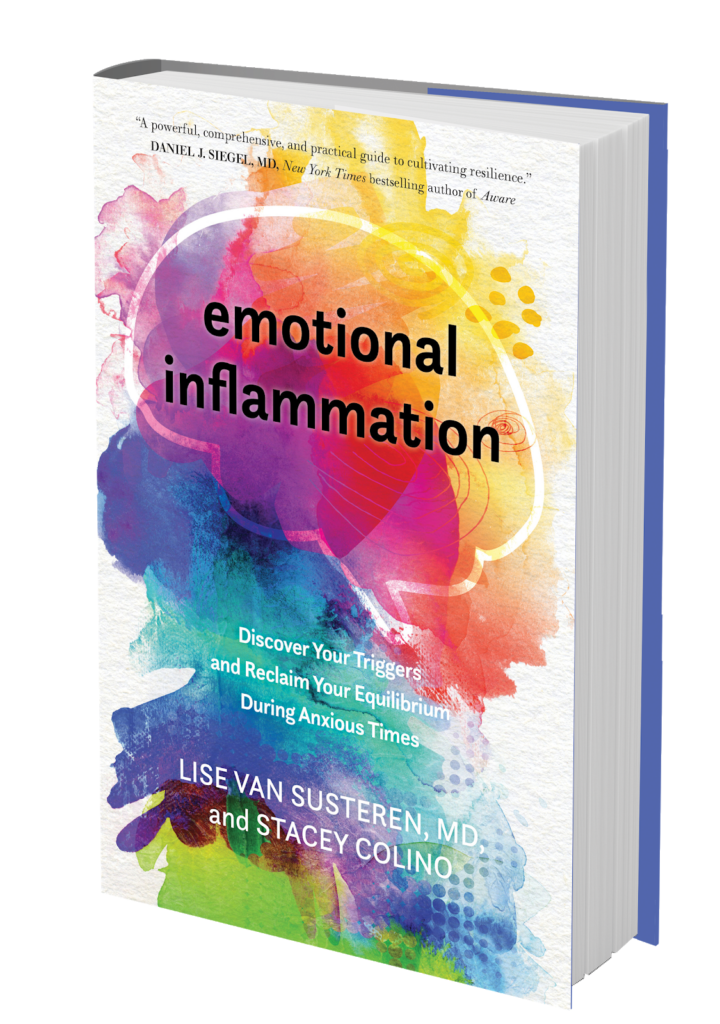
Steve Macadam: Enabling the Full Release of Human Poss...
Steve Macadam was, for 12 years, the President and CEO of EnPro, a $1.4 billion publicly traded company. He received a BS in mechanical engineering from the University of Kentucky, an MS in finance from Boston College, and an MBA from Harvard University, where he was a Baker Scholar. He currently serves as an independent director on the boards of Louisiana-Pacific Corporation and Valvoline Inc. In this week’s podcast, Tami and Steve discuss what it means for a company to have “dual bottom lines,” and the aspiration to create a business with the formal purpose of enabling the full release of human possibility. (1 hour, 13 minutes)
Customer Favorites
Sister Joan Chittister: Lighting a Fire with Faith
Sister Joan Chittister is a member of Benedictine Sisters of Erie, Pennsylvania; the bestselling author of more than 50 books and hundreds of articles; and one of the most influential contemporary leaders and activists for human rights, women’s issues, and church renewal. In this episode of Insights at the Edge, Tami Simon speaks with Sister Joan about the endless interplay between doubt and faith. They discuss the ways in which God sees all of creation, and what this perspective then asks of us. Tami and Sister Joan talk about the necessity of embracing humility, as well as what it means to know the right questions to ask on one’s spiritual journey. Finally, Sister Joan comments on the maturation of faith as one grows older and the “last great adventure” offered by death. (66 minutes)
Loading the player…
Ep 10: We Are the Great Turning
As this journey around the spiral comes to a close, Jess brings us back to the table with Joanna for one last profound conversation. Joanna shares an ancient Tibetan prophecy, “The Coming of the Kingdom of Shambhala,” which shows us that the way we build the Great Turning is through compassion and insight into the radical interdependence of all things.
Jess reflects on the transformative experience of making this podcast, and Joanna expresses deep love and belief in Jess and her generation, urging us to draw upon ancestral wisdom and “the web of connections” to sustain them through the challenges ahead.
In this episode:
- The Shambhala Prophecy tells us to act with compassion and insight into the radical interdependence of all things
- Joanna’s teachings, love, and mentorship will remain an enduring source of strength and guidance for Jess and so many others
- As the spiral of the Work That Reconnects comes to a close, the greater work of the Great Turning continues, carried forward by each person who has been touched by these conversations
- Bonus Exercise: The Shambala Warrior Prophecy
- Bonus Exercise: Callings and Resources
We recommend starting a podcast club with friends or family to do these practices together. Links and assets to help prompt reflection and build community can be found with every episode on WeAreTheGreatTurning.com.
Lama Rod Owens: The Path of the New Saint
To be a New Saint is to move into a direct relationship with suffering—our own and that of the world—and make a commitment to disrupt that suffering in any way we can, for as long as it takes. In this podcast, Tami Simon speaks with Lama Rod Owens about his trailblazing new book, The New Saints: From Broken Hearts to Spiritual Warriors.
Give a listen to this inspiring conversation on how each one of us can become effective agents of social and spiritual liberation. Tami and Lama Rod discuss awakened care and bodhicitta; partnering with ancestral forces and the unseen world; brokenheartedness and our collective emotional labor; disrupting reactivity; the radical act of choosing joy; experiencing our true home; two traits of a prophet: embodying clarity and telling the truth; the New Saint as an ordinary human being; the practice of receiving love; spiritual warriorship and what it means to “fight within love”; prayers of protection; the commitment to get free from suffering; consenting to the work of being a New Saint; and more.
Note: This episode originally aired on Sounds True One, where these special episodes of Insights at the Edge are available to watch live on video and with exclusive access to Q&As with our guests. Learn more at join.soundstrue.com.

